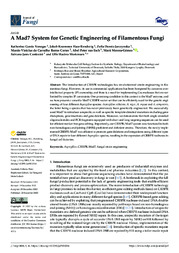A Mad7 system for genetic engineering of filamentous fungi.
A Mad7 system for genetic engineering of filamentous fungi.
Author(s): VANEGAS K. G.; RENDSVIG, J. K. H.; JARCZYSKA, Z. D.; CÔRTES, M. V. de C. B.; VAN ESCH, A. P.; MORERA-GÓMEZ, M.; CONTESINI, F. J.; MORTENSEN, U. H.
Summary: The introduction of CRISPR technologies has revolutionized strain engineering in filamentous fungi. However, its use in commercial applications has been hampered by concerns over intellectual property (IP) ownership, and there is a need for implementing Cas nucleases that are not limited by complex IP constraints. One promising candidate in this context is the Mad7 enzyme, and we here present a versatile Mad7-CRISPR vector-set that can be efficiently used for the genetic engineering of four different Aspergillus species: Aspergillus nidulans, A. niger, A. oryzae and A. campestris, the latter being a species that has never previously been genetically engineered. We successfully used Mad7 to introduce unspecific as well as specific template-directed mutations including gene disruptions, gene insertions and gene deletions. Moreover, we demonstrate that both single-stranded oligonucleotides and PCR fragments equipped with short and long targeting sequences can be used for efficient marker-free gene editing. Importantly, our CRISPR/Mad7 system was functional in both non-homologous end-joining (NHEJ) proficient and deficient strains. Therefore, the newly implemented CRISPR/Mad7 was efficient to promote gene deletions and integrations using different types of DNA repair in four different Aspergillus species, resulting in the expansion of CRISPR toolboxes in fungal cell factories.
Publication year: 2023
Types of publication: Journal article
Unit: Embrapa Rice & Beans
Keywords: Aspergillus, CRISPR, Filamentous fungi, Fungal strain engineering, Fungi, Fungo, Genetic engineering, Mad7
Observation
Some of Embrapa's publications are published as ePub files. To read them, use or download one of the following free software options to your computer or mobile device. Android: Google Play Books; IOS: iBooks; Windows and Linux: Calibre.
Access other publications
Access the Agricultural Research Database (BDPA) to consult Embrapa's full library collection and records.
Visit Embrapa Bookstore to purchase books and other publications sold by Embrapa.

